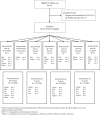Long-term neurodevelopment in children with resected congenital lung abnormalities
- PMID: 37326640
- PMCID: PMC10570195
- DOI: 10.1007/s00431-023-05054-5
Long-term neurodevelopment in children with resected congenital lung abnormalities
Abstract
To determine whether children who underwent resection of a congenital lung abnormality (CLA) are at higher risk for neurodevelopmental impairments than peers in the general population. The study population consisted of children born between 1999-2018 who underwent resection of a symptomatic CLA. Neurocognitive development (intelligence, memory, attention, visuospatial processing, executive functioning) and motor function of this population are monitored through our structured, prospective longitudinal follow-up program at the ages of 30 months, 5, 8, and 12 years. We compared study population scores with Dutch norm values using one-sample t-tests and one-sample binominal proportion tests. Forty-seven children were analyzed. The 8-year-olds showed significant impairments in sustained attention through the Dot Cancellation Test (mean z-scores -2.4; [-4.1; -0.8], p = 0.006 and -7.1; [-12.8; -1.4], p = 0.02 for execution speed and fluctuations respectively). Visuospatial memory was impaired at 8 years, though only in 1 out of 3 assessment tools (Rey Complex Figure Test z-scores (-1.0; [-1.5; -0.5], p < 0.001). Further neurocognitive outcomes were unimpaired at all tested ages. Regarding motor function outcomes, mean z-scores of total motor functioning were unimpaired across assessed ages. However, at 8 years, significantly more children than expected had definite motor problems (18% vs 5%, 95% CI [0.052; 0.403], p = 0.022). Conclusion: This evaluation reveals impairment in some subtests of sustained attention, visuospatial memory and motor development. However, globally, normal neurodevelopmental outcomes were found throughout childhood. We recommend testing for neurodevelopmental impairments in children who underwent surgery for CLA only if associated morbidities are present or if caregivers express doubts about their daily functioning. What is Known: • In general, surgically managed CLA cases seldom suffer from long-term surgery-related morbidity and show favorable lung function. What is New: • Long-term neurocognitive and motor function outcome appear unimpaired within surgically managed CLA cases. We recommend testing for neurodevelopmental impairments in children who underwent surgery for CLA only if associated morbidities are present or if caregivers express doubts about their daily functioning.
Keywords: Congenital lung disease; Long-term outcome; Lung malformation; Motor development; Neurocognitive development; Neurodevelopment.
© 2023. The Author(s).
Conflict of interest statement
The authors have no competing interests to declare that are relevant to the content of this article.
References
-
- Sylvester KGGS, Albanese CT. Congenital Bronchopulmonary Malformations. In: Holcomb GWMJ, Ostlie DJ, editors. Ashcraft's Pediatric Surgery. 5. Philadelphia: Saunders; 2010. pp. 279–289.
-
- Calzolari E, Barisic I, Loane M, Morris J, Wellesley D, Dolk H, Addor MC, Arriola L, Bianchi F, Neville AJ, Budd JL, Klungsoyr K, Khoshnood B, McDonnell B, Nelen V, Queisser-Luft A, Rankin J, Rissmann A, Rounding C, Tucker D, Verellen-Dumoulin C, de Walle H, Garne E. Epidemiology of multiple congenital anomalies in Europe: a EUROCAT population-based registry study. Birth Defects Res A Clin Mol Teratol. 2014;100:270–276. doi: 10.1002/bdra.23240. - DOI - PubMed
-
- Mon RA, Johnson KN, Ladino-Torres M, Heider A, Mychaliska GB, Treadwell MC, Kunisaki SM. Diagnostic accuracy of imaging studies in congenital lung malformations. Arch Dis Child Fetal Neonatal Ed. 2019;104:F372–F377. - PubMed
LinkOut - more resources
Full Text Sources


